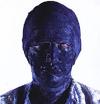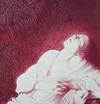Texts and Essays
"Ludwig Museum in the Russian Museum" catalogue – November 30, 1997
Ludwig Museum in the Russian Museum, 1998
GOTTFRIED HELNWEIN
The human face, in particular the child's face, is of great fascination for Helnwein and consequently accounts for one of his central pictorial subjects. The monumental face of a little girl which is introduced here is, as it were, representative of all children. In our adult society oriented towards profit and success, children can almost be described as a fringe group, their interests indeed being observed in a comparatively modest fashion. Against this background, this monumentalizing of the face in connection with the hyperrealistic style of painting is to be understood as an oppressive irritation of our customary experience of perception.
Pg.15
The present-day art process is definitely dependent on context. The real, non-mythologized value of concrete phenomena of Russian art cannot be determined without understanding the entire situation of world art. "German Neoexpressionism from the Sanders Collection", "Verging on the Limit" (American video art) "Gottfried Helnwein", "Installation by Brian Eno" are only a few examples of the exhibitions which have already been organized within the framework of the project.
Perhaps the best proof of the high cultural value of the project "Ludwig Museum in the Russian Museum" is provided by the exhibition room in the Marble Palace - a room laden with great artistic suspense - a vivid transposition of the idea of the general context in which the present-day art process develops.
THE LUDWIG DONATION,
Aleksandr Borovskij
Curator for modern and contemporary art
HELNWEIN
Gottfried
Born 1948, Vienna
Lives and works in Cologne, Ireland and USA.
Pg. 278
"CHILD'S HEAD", 1991
Oil and acrylic on canvas, 650x403.5
The early stages of this monumental head can be seen in Helnwein's widely varied portrayals from the seventies of suffering children, but above all in the Cologne installation of anonymous children's portraits "9th November Night" from 1988.
The human face, in particular the child's face, is of great fascination for Helnwein and consequently accounts for one of his central pictorial subjects. The monumental face of a little girl which is introduced here is, as it were, representative of all children. In our adult society oriented towards profit and success, children can almost be described as a fringe group, their interests indeed being observed in a comparatively modest fashion. Against this background, this monumentalizing of the face in connection with the hyperrealistic style of painting is to be understood as an oppressive irritation of our customary experience of perception.
Originally the child's head was shown in a Minorite church in Krems, Stein; in fact it was placed at the focal point of a huge early Gothic room which lent the picture a positively sacral tone.
Pg.274
"48 PORTRAITS", 1991
Photograph (Cibachrome)
70x55 each
Just less than twenty years after Gerhard Richter did his portrait series of famous men, Helnwein created forty-eight portraits of women, the photographic versions of which are seen here. Prompted by the public protest of feminist Alice Schwarzer against Richter's exclusively male cast of celebrities, Helnwein conceived his female series as a counterpart and alternative artistic statement.
Unlike Richter, whose selection was based primarily on the formal criteria of head position or direction of gaze, Helnwein oriented himself more towards personalities and moreover provided a brief documentation. His panorama brought together historical and contemporary personalities who contributed to cultural and scientific life in the late nineteenth and twentieth centuries, including such fields as popular music, comics, and children's literature. In addition to female authors, poets, artists, actresses, politicians, and physicists, Helnwein depicted pop star Tina Turner, the German translator of Mickey Mouse, Erika Fuchs, and the children's book author Astrid Lindgren. As a supplement to Richter's portraits of Einstein, the artist included a portrait of Mileva Einstein, the physicist's first wife.
Pg.280
"PORTRAITS OF MR. AND MRS. PETER AND IRENE LUDWIG", 1995
4-part (2 diptychs)
Oil and acrylic on canvas
198.5 x 139.5 each board
Helnwein's interest concentrates on the investigation of the human face. In addition to anonymous sitters, including many children, he has portrayed numerous people active in public affairs.
The portraits of the Ludwig couple are conceived as monumental diptychs with a hyperreal portrait on the left panel and a monochrome repetition of it on the right. Viewing this type of portrait as belonging to the tradition of official, courtly portraiture, Helnwein conceived the works not for private display but for a representative public space.
In the course of time the artist came to the realization that a single painting alone was insufficient to capture a sitter's entire personality in all its complexity. Consequently, the dark versions can be seen as an attempt to visualize the mental and intellection aspects or at the very least, to take these into account.
http://www.gottfried-helnwein-interview.com/


